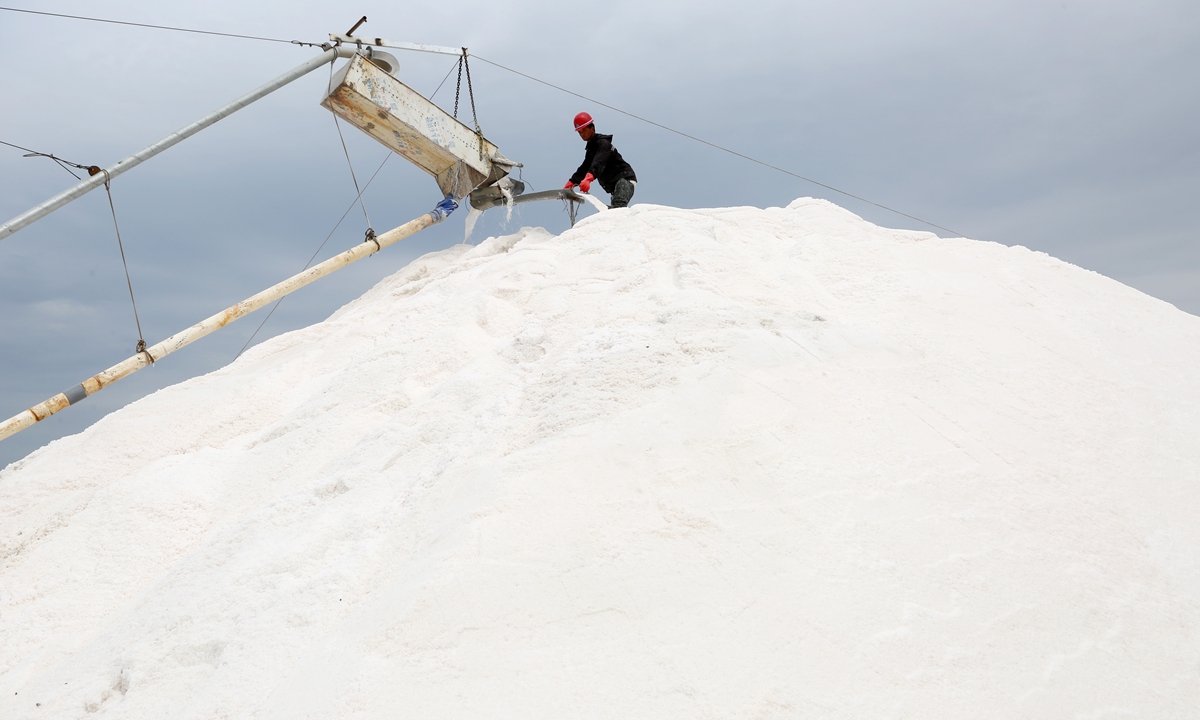Salt products sell out as Japan starts to dump nuclear contaminated water into ocean

Workers stack and dry crude salt in Lianyungang, East China's Jiangsu Province on September 20, 2022. As fall arrives, all salt pans have started "stacking" work, taking advantage of the sunny weather in recent days. Photo: cnsphot
Searches for nuclear radiation detectors that can be used on imported food and cosmetics rose by 232 percent on e-commerce platform Taobao this week, media reports said on Thursday.
Several businesses selling nuclear radiation detectors said their sales surged on Thursday.
Many salt products on Chinese e-commerce giant platform JD.com were marked as sold-out on Thursday, with the exception of a number of imported products and sea salt, the Global Times learned.
On Meituan Maicai, an online grocery service, many salt products were displayed as being out of stock. Some other online platforms also showed low inventory warnings for some salt products.

A screenshot of the sales ranking list of salt on e-commerce platform JD.com on August 24, 2023 Photo: GT
The rush for salt products appeared linked to Tokyo's decision to start dumping nuclear-contaminated water from the Fukushima disaster into the ocean, starting Thursday.
As some cities reported panic buying in supermarkets and groceries, local commerce bureaus said on Thursday that the supply of edible salt is sufficient, and the public is suggested to purchase it rationally in keeping with demand. Officials pledge to ensure salt supply and price stability.
Guangdong Salt Industry Group said on Thursday that the province has a salt reserve of 108,000 tons, which is sufficient to supply the whole province, according to media reports.
"As the only state-owned enterprise in China's salt industry, it is our primary responsibility to ensure supply and quality in the salt market," China National Salt Industry Group (CNSIG) said in a statement posted on Thursday on its official WeChat account.
At present, rock salt accounts for 87 percent of China's edible salt products, while sea salt accounts for 10 percent and lake salt accounts for 3 percent. The production of rock salt and lake salt will not be affected by the nuclear contaminated water from Japan, said CNSIG.
CNSIG is the world's largest salt producer, with a salt production capacity of more than 10 million tons per year, of which 95 percent is rock salt, 4 percent is lake salt and only 1 percent is sea salt. CNSIG's salt reserve supply is sufficient, read the statement.
"Our country has strict food safety regulations, and the amount of salt produced in our country can meet market demand. So it is not recommended to stock up salt now," Wang Xiaoqing, executive director of China Salt Association said.
Some overseas markets have recently seen panic buying of salt. Chinese analysts said that there is no need for the public to panic, let alone follow suit of salt hoarding.
Despite repeated assurances from Japan to neighboring countries that water from the 2011 Fukushima nuclear disaster no longer posed a health risk, many consumers are unconvinced.
After Japan's dumping decision was announced on Tuesday, Chinese customs on Thursday announced that it will halt imports of Japanese aquatic products from Thursday.
Shares of some salt producers soared during the week. Jiang Su Suyan Jingshen Co, which hit the daily increase limit of 10 percent on Wednesday, still saw its share price rise on Thursday by 3.62 percent.
Shares of Jiangxi Salt Industry Group opened 4.91 percent higher on Thursday, after having hit the daily increase limit for two consecutive days on Tuesday and Wednesday.
Jiangxi Salt Industry Group responded to investors on its interactive platform on Wednesday, saying that the company's salt products are mine salt, and the brine essence comes from underground, and are not impacted by pollution.
The company is a main supplier of salt products in southern China. Its salt products are exported to South Korea, Malaysia and other countries, the company said.
Global Times
